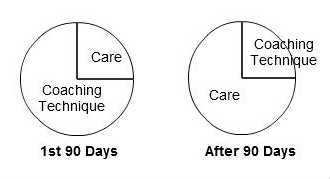Coaching FAQ: How Much of Coaching Is About Technique
One of the most frequent questions about coaching is whether someone has to have led a small group themselves in order to serve as a coach. I answered this question in my post on the essential ingredients of an effective coach but a related question is “how much of coaching is about helping leaders with technique?”
I’ve found that new leaders really only need help with technique at the very beginning of their group.
The first 90 days sometimes require a nudge in the right direction (i.e., “How can I get the one guy to stop dominating the discussion?” or “How can I get that couple to stop criticizing each other in their prayer requests?”). In fact, I’ve found that in the first 90 days, about 75% of what happens between a coach and a leader will be about technique. With the right questions, 25% of the interaction can begin to build a relationship that makes an ongoing role possible (I talk about the right questions in my four part series on Building an Effective Coaching Structure).
Beyond 90 days or so, the amount of “coaching” required is usually minimal, the chief reason being that groups rarely survive beyond 90 days unless the new leader quickly solves certain issues. For example, if they’ve got someone in their group that dominates every meeting…how many meetings will it take before members begin to drop out? If there’s unhealthy conflict between a husband and a wife, how many meetings will be awkward enough to cause members to stop coming or find another option? Unless a leader figures out how to deal effectively with basic issues, the group rarely survives the first 90 days. Consequently, about 75% of what a coach might do in the first 90 has to do with technique and about 25% has to do with care.
I’ve found that this beginning imbalance can lead to a misunderstanding that can affect an ongoing relationship. The 25% that reflects care has much to do with whether leaders recognize the need for ongoing coaching. After all, once the new leader has developed the skills to lead a healthy group…what role will the coach play if it is all about technique? If there is going to be an ongoing role it is going to shift to care. Beyond 90 days (or so) the chief role of the coach becomes providing care (encouragement, accountability, mentoring, etc.) but this begins in the first 90 days. By expressing a genuine interest in the new leader’s life (family, job, prayer requests, struggles, victories, etc.) a foundation can be laid that will be lead to an enduring relationship.


